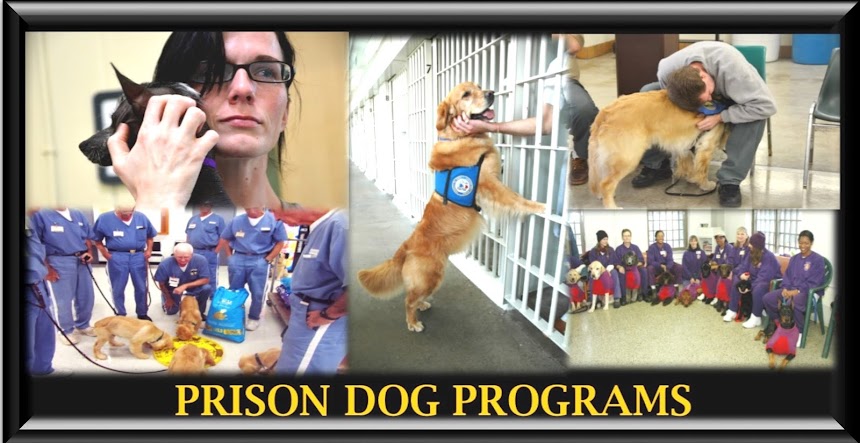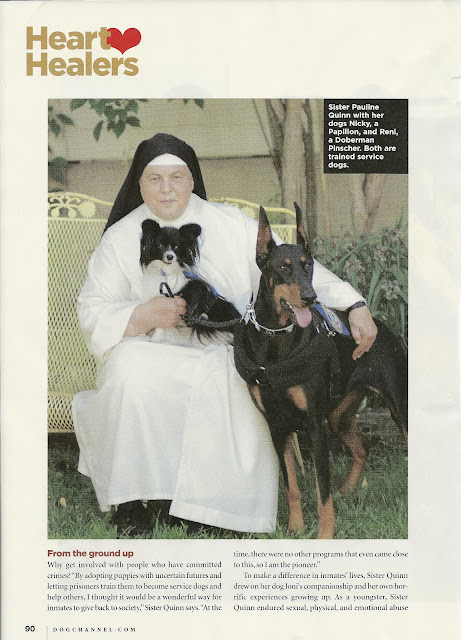PROGRAM IN NEW YORK
~
PROGRAM IN FLORIDA
~
BAY COUNTY CORRECTIONAL FACILITY IN PANAMA CITY, has been collaborating with Auburn University to provide training for dogs destined to become bomb-sniffing and explosive-sniffing dogs.
The program lets a few of the well behaved inmates train a dog through the beginning stages until it leaves for Auburn University. The dogs live with the inmates in their cells and are by their side from 4:30 a.m. when they wake up until 10:30 when they go to sleep.
PHOTOS BY ANDREW JOHNSON
---------------------------------------------------------------------------------
~
--------------------
POLICE DOGS REARED IN AN UNLIKELY KENNEL: NORTH FL. PRISON
Pepper shows off her play ball during training at the Gadsden Correctional Facility in Quincy, Fla., Dec. 23, 2008, 2008. The Gadsden program is one of a handful launched in recent years to train and prepare dogs for advanced training and use by law enforcement.
By: By JESSICA GRESKO Associated Press Writer | JCFloridan.com
Published: January 28, 2009 Updated: January 28, 2009 - 9:55 PM
» Comments | Post a Comment
QUINCY, Fla. (AP) — Casey West says "search," and her black Lab, Oscar, charges at the command toward six plastic plant pots lined up on the floor of this north Florida prison.
The dog dashes past the first four pots, skids on the concrete near pot No. 5, then doubles back to knock over pot No. 4 with his nose, revealing a towel doused with a sweet scent he has been trained to detect.
"Yeah, yeah. Woo-hoo!" West shouts as she tussles playfully with Oscar, his tail wagging.
Behind her, more than two dozen women inmates at Gadsden Correctional Institute burst into applause. They know the drill. All these inmates raise and train bomb-sniffing and scent detection dogs.
A number of prisons ready service and companion dogs for the blind and disabled, though programs training dogs for law enforcement are newer. Gadsden is one of three private prisons in Florida and Georgia that have together raised nearly 100 dogs since 2005.
The dogs go to Auburn University in Alabama for specialized training, then on to sniff for explosives and chemicals with sheriff's offices, the Coast Guard and the Department of Homeland Security. The dogs can also be trained to sniff out drugs, and four of the animals were tapped for explosives-sniffing detail for President Barack Obama's inauguration.
The dogs stay with the inmates 24 hours a day, even sleeping in crates beside inmates' bunk beds. That commitment has meant success rates for dogs raised in prisons at about four times that of dogs raised by a family on the outside, according to Jeanne Brock, a senior instructor at Auburn's Canine Detection Training Center.
The program has been so successful that another one at a Florida youth facility is to start this year, and Auburn now exclusively uses dogs raised by prisoners rather than from families or other sources.
And it's not easy to get into the program.
Prisoners chosen to train dogs can have almost any conviction — from murder to embezzlement — as long as they have a clean disciplinary record. They also must have two years left on their sentences so they can devote a full year to raising a dog.
While prison has been good for the dogs, the dogs have been good for prisoners.
At Gadsden, Heather Adams opened a photo album to show the two dogs she has raised. There's a shot of Adams wearing a Santa hat beside her second dog Mack, whom she called "Mack-a-Doodle" and chokes up when talking about. And there is one of her with her first dog, Foose, a chocolate Lab who went on to receive advanced training in detecting explosives on humans.
When she heard Foose was deemed fit for the specialized training, Adams said, "I felt like my kid got into Harvard."
West, 29, said she wouldn't mind if her dog goes on to detect drugs even though a drug conviction landed her in prison. In fact, she said, prison gave her a second chance, so sending someone else to prison might just be helping them.
"I feel like I'm making amends. It feels therapeutic," she said of raising Oscar in Gadsden's 3-year-old program.
And 24-year-old Ashley Chaganis, with her first dog Que, said the program has made her more aware of her feelings. "For the past 10 years of my life I haven't really cared about anything," said Chaganis, who's serving 10 years for robbery.
Training the dogs — all Labradors — keeps the inmates busy learning problem-solving and teamwork, said Sandra Sexton, who oversees the program at Gadsden, a women's minimum- and medium-security prison for about 1,500 inmates.
Sexton's program has raised 15 dogs since starting in 2005 as a way to teach inmates new skills that will help them reintegrate into society. The inmates say the responsibility of raising a dog has made them less self-involved, less depressed and even less violent.
"We're all in prison because we were selfish in some way. Having a dog in here has conditioned me not to be selfish," said Wyn McDonald, 38, now raising her third dog as she nears the end of an eight-year sentence for DUI manslaughter.
Prisoners take care of the dogs from eight weeks to about 1 year old. The canines are then sent to Auburn for about five more months of training before being sent out on duty. The trained dogs can cost $10,000 each.
Training the dogs behind razor wire has its challenges.
Other inmates can be rude, heckling the handlers as they pick up after their dogs. Occasionally the dogs must be taken off prison grounds to experience road traffic, malls and sporting events. And saying goodbye can be the hardest moment, even if the inmates know their dogs have big tasks ahead.
"A lot of these inmates have never been loved, have never loved something," said Sharon Gavin, who oversees the scent-detection dog programs for Corrections Corporation of America, the Nashville, Tenn., company that runs the prisons in Florida and Georgia where such dogs are raised.
The inmates work is getting noticed by the law enforcement officers who benefit from it. Tracy Turner, an Amtrak police officer who worked with her muscular yellow Lab, Holt, 12 hours daily to prepare for the inauguration, said she knows what she'd say if she met the inmate who raised her dog.
"Thank you," she said. "You did a great job."
-------__----------------------------------------------------------------------------
-------------------------------------------------------------------------------
PRISONERS IN JAIL TRAIN BOMB SNIFFING DOGS
In an interesting turn of events, prison inmates are being used in a pilot program designed to train future law enforcement officers; inmates at the
In an interesting turn of events, prison inmates are being used in a pilot program designed to train future law enforcement officers.
Inmates at the Panama City- Bay County jail will help train two future bomb-sniffing dogs.
The two Labradors, named Pancho and Peyton, are still puppies so they require a lot of attention.
Dakota Catt, one of three inmates chosen to participate in the program, said, “It’s a 24/7 job. They live beside our bunks. We live with them every single day. They’re in here with us.”
Prison officials said the three individuals were chosen due to their limited criminal record and the fact that they did not have a violent history.
“They’re inmates that are really considered trustees and somebody who can be trusted to handle a dog that is very valuable,” said Warden Rick Anglin.
Every day the inmates train the Labrador puppies in an outdoor play area.
“They could be working to look for drugs or explosives,” said Sharon Gavin the K-9 Program Director.
The program is funded by Auburn University which will eventually take custody of the pups after a year for more specialized training in bomb and drug detection.
Joseph Leberte, another of the three chosen to help raise the dogs, said he was grateful for the opportunity.
“I really appreciate the chance that they’ve given me to do this so it’s just really rewarding and I appreciate it,” said inmate Joseph Leberte.
Prison officials hope the program will continue and they will have the chance to raise more dogs.
PRISON DOG PROGRAMS ~ HELPING PRISONERS TO HELP OTHERS
Saturday, June 30, 2012
Saturday, June 16, 2012
A FEW PRISON DOG PICTURES
THE FIRST PRISON DOG PROGRAM IN 1981
WASHINGTON STATE CORRECTIONAL CENTER FOR WOMEN
THE FIRST PRISON DOG PROGRAM IN 1981
WASHINGTON STATE CORRECTIONAL CENTER FOR WOMEN
HELPING PAWS PRISON PROGRAM ~ ILLINOIS
JANET ON RIGHT CEO OF NEW HORIZONS SERVICE DOGS AT SAGO PALMS CORRECTIONAL IN FLORIDA
HELPING PAWS PROGRAM ~ ILLINOIS
PRISON ADMINISTRATION ARGENTINA WITH SR PAULINE AND HER SERVICE DOG RENI AND DR ROMERO ON LEFT
RENI AND NICKY VISTING THE YOUTH CORRECTIONAL CENTER IN CALIFORNIA
REBIBBIA PRISON ~ ITALY
WASHINGTON STATE
YOUTH AUTHORITY IN CALIFORNIA ~ JANETTE THOMAS TRAINER AND DIRECTOR OF THE CALIFORNIA PATHWAYS PROGRAM.. ON LEFT STANDING AND SISTER PAULINE ON RIGHT
HELPING PAWS PROGRAM ~ ILLINOIS
MIAMI FL
DEATH ROW ~ ANGOLA PRISON LOUSIANA
ITALY ~ PRISON HORSE PROGRAM
ALASKA
ARGENTINA
ARGENTINA
POLAND
WASHINGTON STATE
HELPING PAWS PROGRAM ~ ILLINOIS
GREEN BAY, CORRECTIONAL
RENI ~ PRISON SERVICE DOG
NEW HORIZONS PRISON DOG PROGRAM ~ FLORIDA
DOG FOOD PROVIDED BY FROMMS DOG FOOD IN WISCONSIN
PATTY TEACHING THE INMATES IN FLORIDA
JANET, CEO OF NEW HORIZONS AT THE PRISON DOG PROGRAM IN FLORIDA
CALIFORNIA INSTITUTION FOR WOMEN.. A CST PROGRAM
CALIFORNIA YOUTH AUTHORITY JANETTE THOMAS TRAINER AND A PATHWAYS DIRECTOR OF THE PROGRAM
REBIBBIA PRISON IN ROME, ITALY
JANET THOMAS DIRECTOR OF THE PATHWAYS TO HOPE CALIFONIA YOUTH AND PROGRAM TALKING WITH SHORTY, OF ANIMAL PLANETS PROGRAM PIT BOSS.
PRISON DOG GETTING HER NAILS DONE
PATHWAYS TO HOPE PAWS YOUTH CALIFORNIA PROGRAM. SHORTY FROM THE ANIMAL PLANET PROGRAM "PIT BOSS" CAME TO VISIT
SERVICE DOG TRAINED IN PRISON TO HELP A WOUNDED VET
SERVICE DOG TRAINED IN PRISON TO HELP A WOUNDED VET
Friday, June 15, 2012
Subscribe to:
Posts (Atom)








































